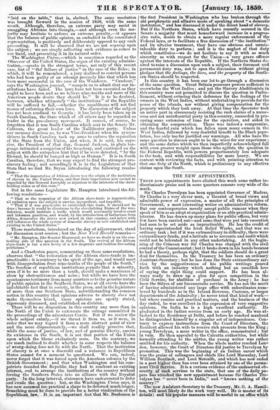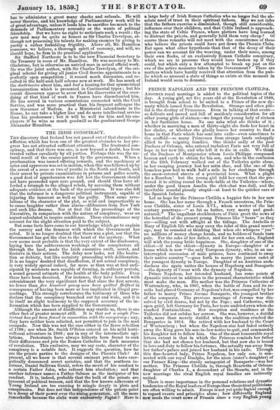THE NEW APPOINTMENTS.
THREE new appointments have elicited this week some rather in- discriminate praise and in some quarters censure very wide of the mark.
Sir Charles Trevelyan has been appointed Governor of Madras. Sir Charles is a very clever mein, a theorist of broad views and admiiable power of expression, a master of all the principles of Government, a most interesting writer on administrative reform. But our contemporaries merely accept public rumour when they speak of him as an adept at organization or an able practical admin- istrator. He has drawn up many plans for public offices, but very few have been carried out—and some that were put into execution had soon to be set aside as impracticable. He has the credit of having superintended the Irish Relief Works, and. that was no ordinary task ; but if it was extraordinary in difficulty, there were extraordinary funds, and a latitude as to accounts and audit which could not be tolerated in any other undertaking. At the begin- ning of the Crimean war Sir Charles was charged with the civil control of the Commissariat ; but it broke down in his hands because he had a theory, perhaps right, that the soldiers should do a great deal for themselves. In the Treasury, he has been an ordinary Assistant-Secretary; but he has done the State extraordinary ser- vice by the suggestiveness of his public -writings poured forth with an industry which nothing buf an unselfish love of saying the right thing could support. He has been al- ways ready to draw up a plan for open competition in the Civil Service, for abolition of purchase in the Army ; he has been the &eyes of our bureaucratic service. He has not the merit of having administered any large office with subordinates num- bered by hundreds as in the Inland Revenue, Customs, or larger departments of the Admiralty ; he never tried that kind of work— but where routine and practical 'matters, and the business of the day ended, he was excellent in the expression of very suggestive opinions. On India he is a high excellent authority. He graduated in the Indian service from an early age. He was at- tached to the Residency at Delhi, and before he reached manhood he distinguished himself by a singular act of independence. Con- trary to express instructions from the Court of Directors, the Resident allowed his wife to receive rich presents from the Lag; young Trevelyan, a mere writer in the office, remonstrated ; but in vain. He then appealed to the Calcutta authorities, but while formally attending to the niatter, the young writer was rather snnbbea for his audacity. When the whole matter reached Lenz don, however, the Court of Directors did justice to Trevelyan by promotion. This was the beginning of an Indian career which was the praise of colleagues and chiefs like Lord Macaulay, Lord William Bentinek, and Lord Metcalfe, and which has now ended in a post higher than has ever been attained by one of the perma- nent Civil Service. It is a curious evidence of the undeserved ob- scurity of such services to the state, that one of the daily pa- pers has attacked the new appointment because Sir Charles Tre- velyan has "never been in India," and "knows nothing of the country !"
The new Assistant-Secretary to the Treasury, Mr. G. A. Hamil- ton, will most likely do the work very well. He is master of its details ; and his popular manners will be useful in an office which has to administer a great many checks and refusals. He will never theorise, and his knowledge of Parliamentary work will be of great advantage, unless it leads him to sacrifice too much to the demands of Parliamentary necessity or the wants of political friendship. But we have no right to anticipate such a result ; the new man may be quite as honest as Sir Charles Trevelyan, al- though not possessing his talents for making enemies by giving to purity a rather forbidding frigidity. Above all, Mr. Hamilton possesses, we believe, a thorough spirit of economy, and will, we should hope, be firm in its practical application.
Sir Stafford Northcote is to be the new Financial Secretary to the Treasury in room of Mr. Hamilton. He was secretary to Mr. Gladstone but is otherwise an untried man in actual official work. He was the joint author, with Sir Charles Trevelyan, of the ori- ginal scheme for giving ;111 junior Civil Service appointments to a perfectly open competition ; it roused much discussion, and re- sulted in the half-and-half scheme now at work. He has much of the doctrinaire about him, and had a leaning for that symmetrical bureaucratism which is presented in Continental types ; but his recent discourses appear to avow that his discoveries of the over- doing of that kind of work in France have disenchanted him. He has served in various commissions connected with the Civil Service, and was more practical than his frequent colleague the new Governor of Madras. As a Ministerial subordinate in the House, he can take a higher line and do more intellectual service than his predecessor ; but it will be well for him and his em- ployers if he wins as much goodwill as the goodnatured George Alexander Hamilton.



























 Previous page
Previous page